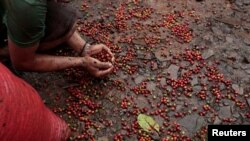Armed with smartphones, thousands of smallholder farmers across Latin America are set to benefit from a technology boost that will help them deal better with the effects of climate change.
A three-year agreement will see farmers receive vital information such as weather forecasts and early warnings via their smartphones, as well as online training and equipment to help improve water usage.
"There are 70 countries in the world today that have no access to weather information," said José Graziano da Silva, director general of the United Nations' Food and Agriculture Organization (FAO).
He was speaking after signing the agreement on Monday with Spain's Telefónica SA, one of the world's largest telecommunications companies.
"They don't know if it's going to rain other than by looking out of the window," he said, adding that the deal would help to reduce the divide between rural and urban areas on access to information and new technology.
"We believe that there is an urgent need to use the data and information available globally and translate it into useful and accessible information locally, useful to small-scale producers," he said.
A pilot project will help farmers in El Salvador and Colombia maximize their water resources. It is similar to an existing project of Telefónica's in Chile, which has struggled with a multi-year drought.
The project in Chile covers 17,000 hectares and 10 crops in four regions, and uses specialized equipment whose sensors measure humidity and solar activity, among others, and send data via a low-cost wireless network.
FAO said the project would be replicated in areas of Central America's "Dry Corridor" which runs through Guatemala, El Salvador, Honduras and Nicaragua.
Home to about 10.5 million people, experts say it is vulnerable to extreme weather exacerbated by climate change.
Once the data is processed, farmers get recommendations specific to their crops on their smartphones, leading to a 20 percent reduction in water usage, said Vicente Muñoz, Telefónica's chief officer on the Internet of Things (IoT).
"So we have the experience, the knowledge, and the distribution for this collaboration with FAO," Muñoz told the Thomson Reuters Foundation.
IoT refers to devices such as mobile phones, computers, cars and refrigerators that are connected to the internet.
Many of the world's 460-500 million smallholder farmers have limited resources in terms of labour, education, training and finance, experts say. In areas such as Asia and sub-Saharan Africa, they produce up to 80 percent of the food consumed.
ROME —





